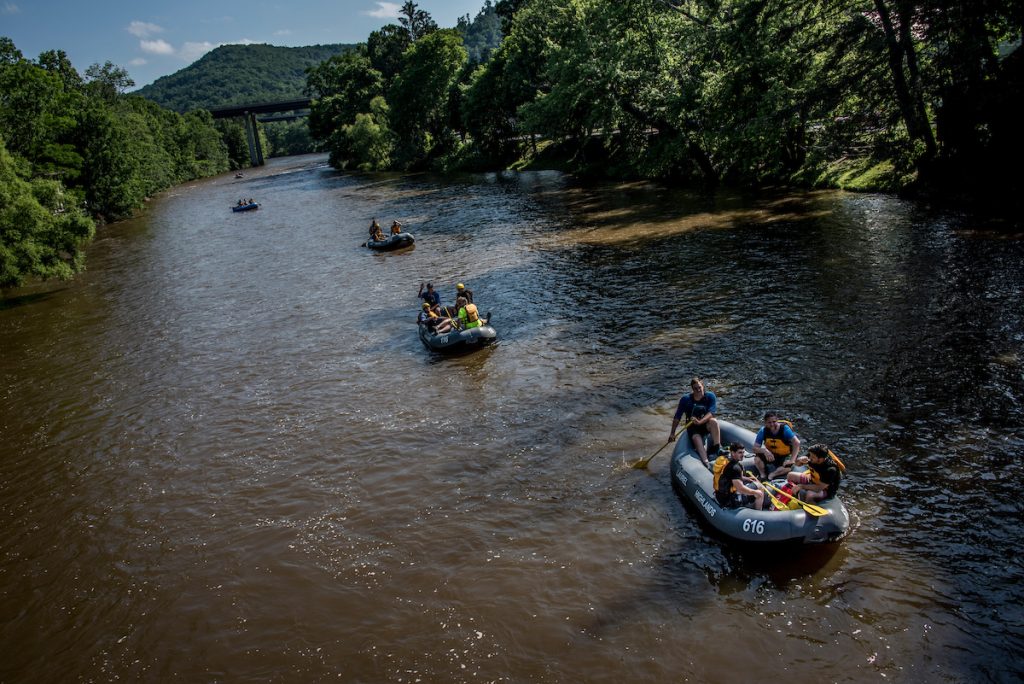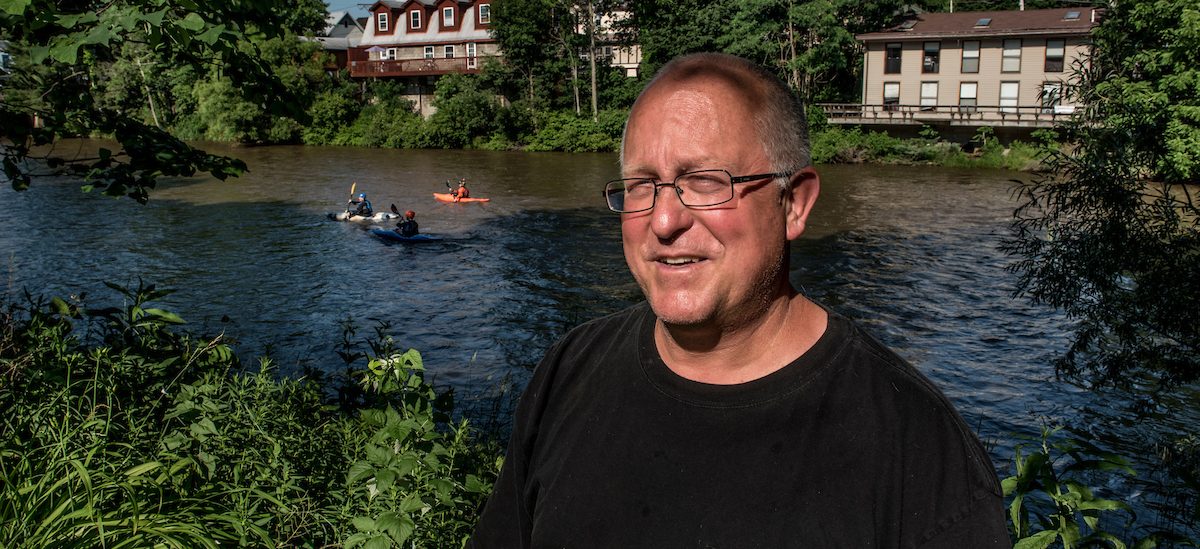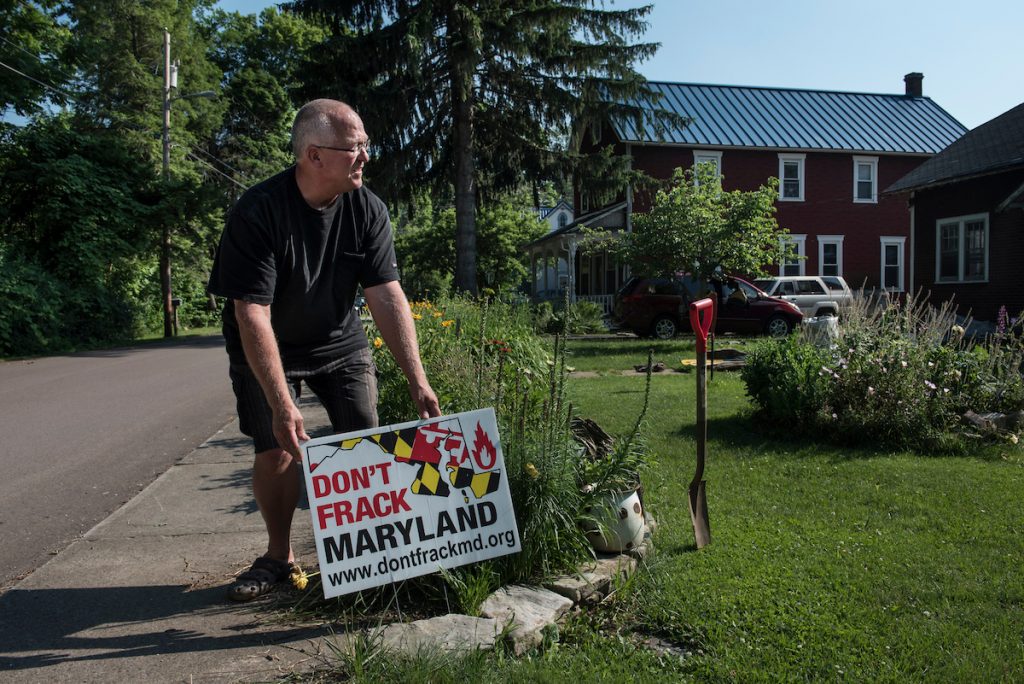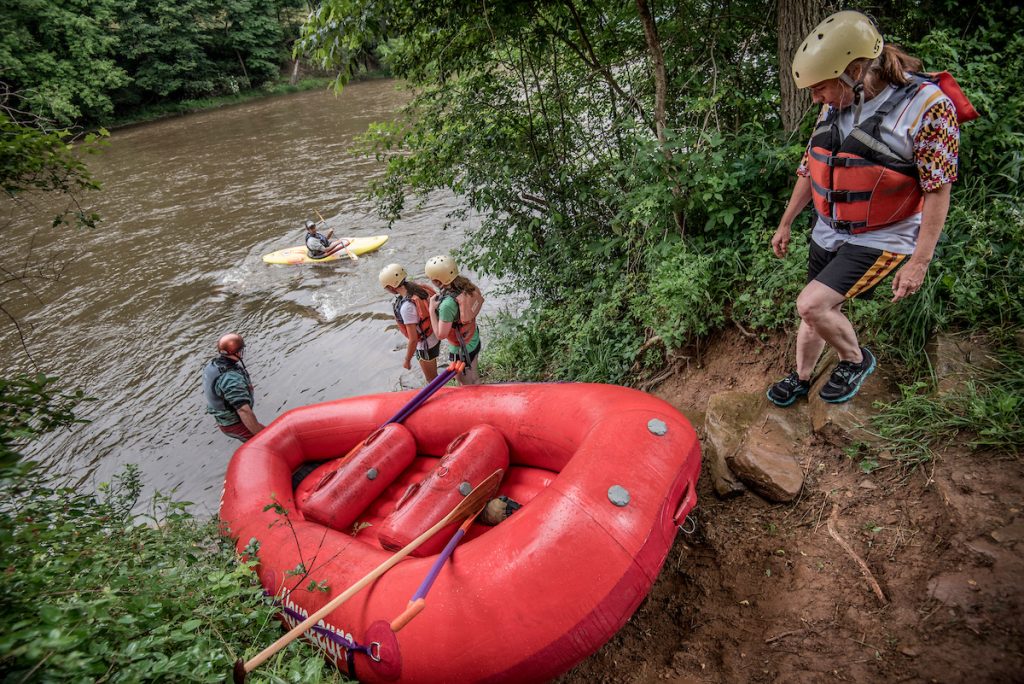Kayaking Gear Designer Fights Current on Fracking
Jess Whittemore is all about the water.
 He lives on Water Street in the Town of Friendsville, Garrett County, Maryland, and his white-placard home looks upon the Youghiogheny River.
He lives on Water Street in the Town of Friendsville, Garrett County, Maryland, and his white-placard home looks upon the Youghiogheny River.
When not designing kayaking gear and suits, he often can be found sitting on his front porch in an Adirondack chair, watching the rafters and kayakers as they float by after having navigated a 7-mile stretch of Class V rapids on the Upper “Yough.” The challenging white water is the result of scheduled dam releases from Deep Creek Lake that occur 66 times each year. The “Yough” provides the drinking water for the Town of Friendsville, population about 500, where Jess serves on the Town Council.
He’s a friendly, middle-aged man with keen eyes, an easy smile, and an abundance of civic pride for his community, which he has called home for more than 35 years. Maryland has an absolute jewel of a river here,” he explained. “The Yough provides clean drinking water – it’s filtered only through sand – no chemicals needed, and our whole economy continues to grow primarily around the river resource – rafting, kayaking, fishing, hiking, biking, and the like. Our future growth depends on a clean river, it’s why visitors come here!”

Jess is opposed to fracking anywhere in Maryland, but especially in Friendsville. From his perspective, opening up western Maryland to hydraulic fracturing is inviting the perfect storm into a tranquil, economically improving, and ecologically important environment. “Friendsville is ground zero for fracking in Maryland,” he said, his voice rising with consternation. “Two-thirds of the entire land mass of Garrett County drains into the Yough. We are a river resource town at the bottom of the hill – we’re at the lowest elevation of the river in the entire county.”
Jess is particularly concerned about the hundreds of different chemicals used in fracking, many of which are carcinogenic or otherwise toxic, making their way over land and through the water table, and eventually to the Yough. “It all comes to us,” he emphasized. “If one well fails, it comes to us. If 10 of them fail, all the poison will come to us.”

Recognizing that Garrett County is more conservative than the rest of the state, he worries that gas companies have sold his fellow county residents a pack of lies. “Folks around here think fracking is safe, that it’s good for the economy and brings in jobs,” he said, pausing to wave as a neighbor passes with his black lab. He added, almost in a whisper, “But they are crappy jobs. The good jobs? The gas companies bring their own folks in for those.”
Working with a local activist organization called Citizen Shale, which provided technical assistance, as well as other larger organizations, including Food and Water Watch, Jess introduced a bill to the Town Council that would ban fracking in Friendsville. He is also working to help ensure that fracking companies don’t withdraw water from the Yough – at least not within town limits. Fracking requires enormous amounts of water – generally anywhere from two to eight million gallons per fracked well. Jess’ focus is on protecting the source of Friendsville’s drinking water – both the Yough itself and the groundwater well the town would need to drill in case the river fails.
“I think the ban will pass,” he assured with a knowing grin back in June. “We’ve got the votes. And maybe it’s just symbolic. Who knows what the courts will do if the statewide ban is lifted, but we’ve got to start somewhere.”
 It turns out that Jess’ premonition was accurate. The Friendsville fracking ban passed, by a vote of 5-1, in July, making this small town the fourth in the state (and second in Garrett County) to adopt a local prohibition. Although suburban Montgomery and Prince George’s counties also passed fracking bans, they are much less threatened than western Maryland and Pennsylvania because they lack the gas-rich geological formations.
It turns out that Jess’ premonition was accurate. The Friendsville fracking ban passed, by a vote of 5-1, in July, making this small town the fourth in the state (and second in Garrett County) to adopt a local prohibition. Although suburban Montgomery and Prince George’s counties also passed fracking bans, they are much less threatened than western Maryland and Pennsylvania because they lack the gas-rich geological formations.
What’s contagiously attractive about Jess’ work to protect Friendsville and the Yough from fracking is that he is solution-oriented. “We’re a small town,” he said. “We’re trying to get something done – something sustainable. But we’re not NIMBY [Not in My Backyard] people,” he emphasized.
As an alternative to fracking, and as a way to stimulate the economy, Jess supports the vision of a Friendsville group to plan investments in renewable energy. “You can’t just oppose one thing without offering something in its place,” he explained. As a member of FREE – Friendsville Renewable Energy Effort – which is a subcommittee of the Town Council, he and fellow committee members are setting their sights first on powering the town government buildings.
“We want to take Friendsville off the grid – we want to go solar,” he grinned, folding his arms across his chest. “We want Friendsville to be the alternative to fracking – the poster child for renewable energy consumption.”
But Jess admits it won’t be easy. “Garrett County is not wealthy – it’s hard to convince people who are struggling economically to install solar power,” he acknowledged. “I think we’ll get there, though. People in Friendsville care about their drinking water more than anything – the Yough means everything to us.”


